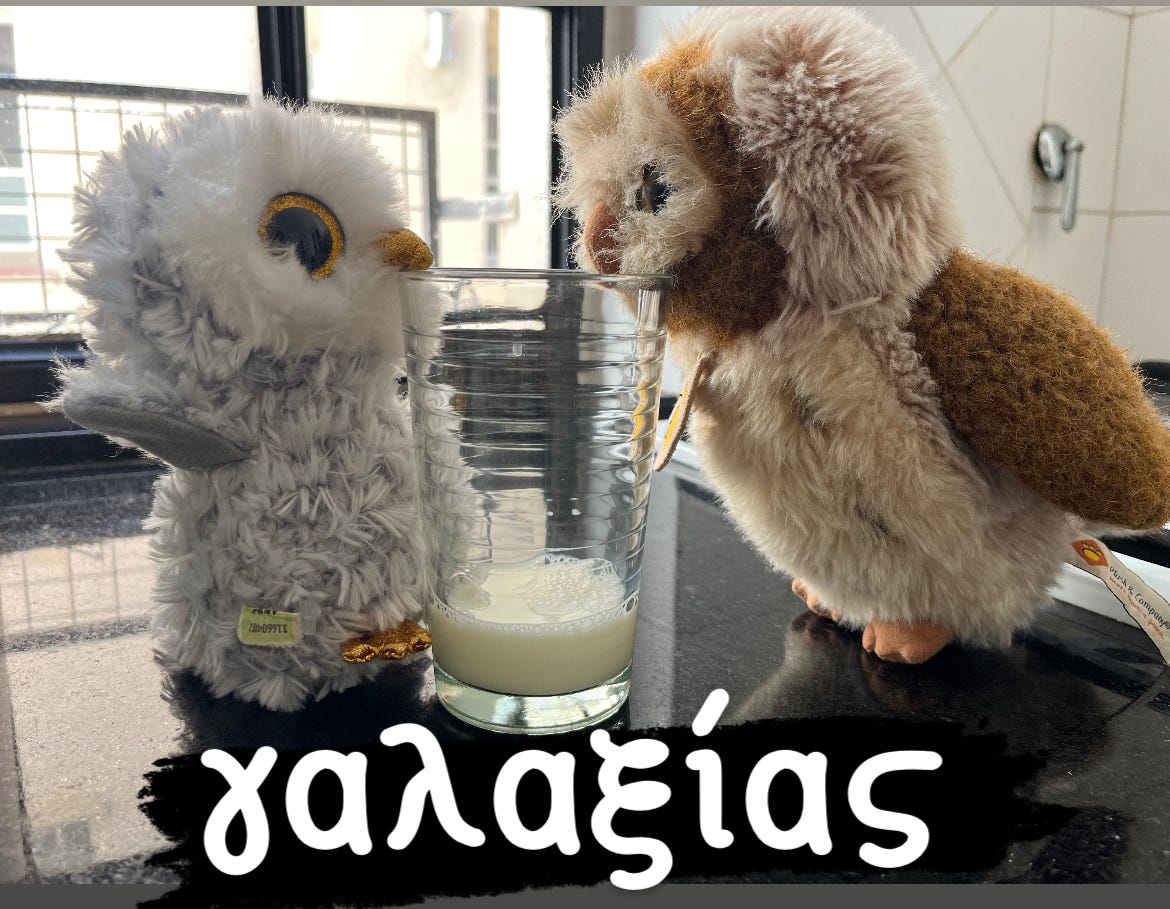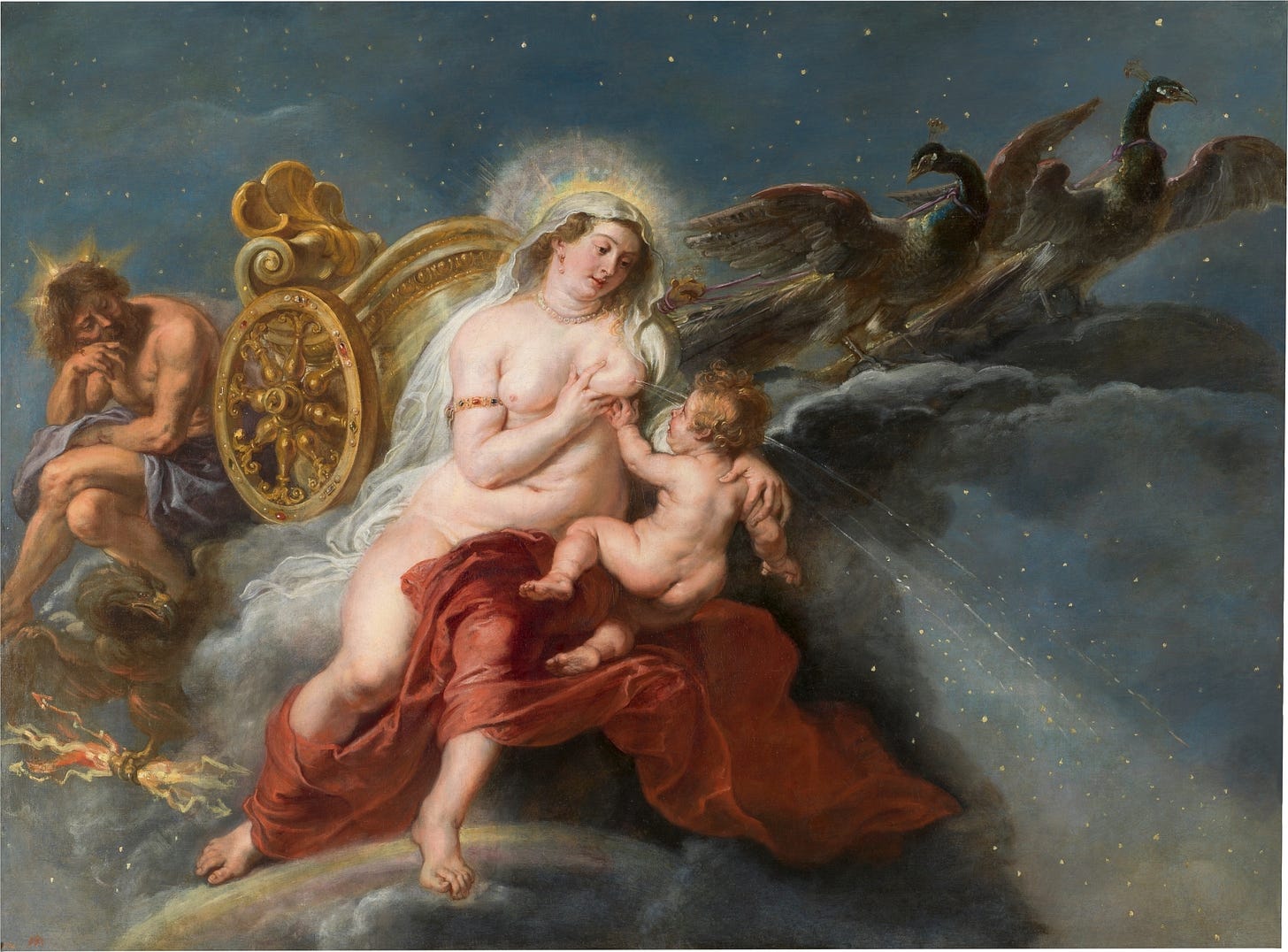Dear Classical Wisdom Kids,
We will continue looking UP with today’s Ancient Greek Word of the Week: γαλαξίας.
I know I shouldn’t pick favorites... but this word is definitely in my top ten of ancient Greek terms (and that’s a big claim!)
That’s because it’s a word we all know without (necessarily) knowing the fantastic myth behind it. Learning terms like this is like having x-ray spec to see into our mythic past. How cool!
But before we get into the word itself, Eugenia has helpfully provided a link on how to pronounce it. Scan below or click here to see how to say it yourself:
Also, she has provided traceable worksheets to practice writing out the words. We’ve included the one for Galaxy, as well as last week’s Star word, below.
Enjoy!
All the best,
Anya Leonard
Founder and Director
Classical Wisdom and Classical Wisdom Kids
P.S. If you didn’t catch our Lost City of Atlantis games, make sure you do so here. And if you aren’t a member, please subscribe to enjoy ALL our activities:
Got (Cosmic) Milk?
By Eugenia Manolidou, Elliniki Agogi
So many words regarding the stars, the skies and the heavens come to us from Greek mythology. One such term that has a fascinating mythological story is “galaxy,” in Greek «γαλαξίας» (galaxías).
The story begins with Hercules, the son of Zeus and Alcmena, whose birth made Hera, Zeus's wife, extremely mad. Fearing Hera's hostility, Alcmena left the infant Hercules on a hill to face an uncertain fate. However, Athena, the goddess of wisdom, intervened and changed the course of Hercules' life. Athena brought the child to Mount Olympus, where he was raised among the gods.
A crucial moment in this celestial epic occurred when Athena gave Hera the baby Hercules to nurse. In a divine twist, Hercules bit down with such force that Hera pushed the baby away, causing her milk to scatter across the night sky.
This incident gave birth to the luminous trail we now know as the Galaxy. It is also called the Milky Way, having translated the first part of the word directly from the Greek word «γάλα» (gála), milk.
As we have seen in the previous post “Blame it on the Stars”, Ancient Greek has influenced many cosmic terms:
“Planet,” which derived from the Greek “planítis,” (πλανήτης) reflects the ancient belief in wandering stars.
“Cosmos” comes from the word «κόσµος» (order or jewel) which shows us that the Greeks that the universe was ordered. In Greek philosophy, the cosmos represented the harmonious and orderly arrangement of the universe, including everything in existence. This term found its way into Latin and eventually into English, capturing the idea of the well-ordered and interconnected nature of the world.
“Comet,” is rooted in “komítes,” (κοµήτης), referring to the long-haired wonders that traverse the heavens.
“Asteroid,” comes from the Greek “asteroidís,” (ἀστεροειδής), a star-like celestial bodies which is neither a planet nor a comet.
The exploration of the cosmic logos unveils a fascinating connection between Greek myths and the words we use to describe the universe. The myth of Hercules, the creation of the Milky Way, and the birth of the term “galaxy” show the lasting impact of ancient narratives on our understanding of the cosmos.
So, from now on, when gazing at the night sky, remember these ancient words that transcend time, connecting you to the Greek cultural and linguistic roots embedded in the stars above.
WRITE IT OUT:
Time to practice tracing ancient Greek. If you are like me, writing in different alphabets is A LOT of fun. It’s also great for reinforcing fine motor skills and learning the words of the week. You can find the ancient Greek words for Galaxy and Star, below:








